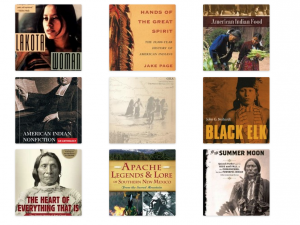After decades of indigenous-led organizing, the United States Congress passed a Joint Resolution designating November as Native American Heritage Month. This November, as we celebrate Native American Heritage, we recognize that Native Americans were not only the original inhabitants of the lands that now constitute the United States of America, as the Joint Resolution affirms, but also continue to be a part of our life and culture.
For example, while treaties are often described as a thing of the past, the Standing Rock Sioux Tribe, and the Army Corps of Engineers are currently in a dispute related to the Fort Laramie Treaty. The Standing Rock Sioux contend that the Army Corps of Engineers (see their statement 11/14 calling for additional discussion and analysis) are in violation of the 1869 treaty in their approval of the highly controversial Dakota Access Pipeline that will "pass through and likely destroy Native burial sites and sacred places," according to the Standing Rock Sioux Tribe legal team.
"We must remember we are part of a larger story," wrote LaDonna Brave Bull Allard in a recent article in Yes Magazine. "We are still here. We are still fighting for our lives." Her great-great grandmother survived the Inyan Ska Whitestone Massacre of 1863, during which U.S. Army attacked an intertribal buffalo hunt, during which an estimated 300 to 400 were killed. "153 years after my great-great-grandmother Mary watched as our people were senselessly murdered. We should not have to fight so hard to survive on our own lands."
In honor of Native American Heritage Month, PCPL is highlighting and expanding its collection of books on Native American History, including contemporary books by indigenous authors including An Indigenous Peoples' History of the United States, and a new picture book by Sherman Alexie, Thunder Boy Jr. Continue to visit our website and catalog throughout the month for more titles!
You may already have heard of the MacArthur Fellow, Linguist, and Cultural Preservationist Ofelia Zepeda. In addition to her seminal text A Papago Grammar, also published as A Tohono O'Odham Grammar, Zepeda is the author of two books of poetry (Where Clouds Are Formed; Ocean Power) published by the University of Arizona Press, whose mission is to enrich understanding and inspire curiosity, and which displays its ongoing commitment to Indigenous and Native American studies through its award-winning literary series, Sun Tracks, opens a new window.
Some other especially notable local Native authors, many of whom have been professors at the University of Arizona and Arizona State University, include: Simon J. Ortiz, a “leading figure in the Native American literary renaissance,” according to the Poetry Foundation; Diné author and poet Laura Tohe; and distinguished author of both academic work and popular fiction Tom Holm.
More local resources:
- A list of books about the Yaqui and O'odham tribes, Folklore, daily life, culture and history.
- Tucson Indian Center
- Browse more O'Odham and Yaqui books in our catalog
- Learn about the O'Odham and the Yaqui tribes in our U.S. History in Context database.
- The Poetry Center at the UA has a wonderful collection of Native American work, and frequently invites notable indigenous poets such as Joy Harjo, Sherwin Bitsui, and Ofelia Zepeda to read and lecture. And here's a book list of some great Native American poetry you can check out here, too!
More resources celebrating Native American heritage:
- Learn all about the notable Native Americans, both historical and contemporary figures, featured this month in our Biographies in Context database
- #ownvoices: Indigenous Authors, and book lists gathering indigenous voices in books for kids, teens, and adults
- American Indian Movement book list
- For further information on the Dakota Access Pipeline and other contemporary and historic indigenous issues, the #StandingRockSyllabus is a comprehensive starting point.
Links updated 2020.12.24


